J-Clinic set to revolutionize disease prevention, detection and treatment
Transforming medical outcomes for people around the world – that’s the bold ambition set out for the Abdul Latif Jameel Clinic for Machine Learning in Health (J-Clinic), the newest collaboration between Community Jameel and the Massachusetts Institute of Technology (MIT) in Boston.mit.edu
The development of machine learning artificial intelligence (AI) technologies that can revolutionize the prevention, detection and treatment of disease will be put under greater focus than ever when J-Clinic – the fourth major collaboration between Community Jameel and MIT – begins its work.
It will concentrate on creating and commercializing high-precision, affordable and scalable machine learning technologies in areas of healthcare ranging from diagnostics to pharmaceuticals, across conditions as diverse as cancer, Alzheimer’s, Parkinson’s, diabetes, kidney disease and asthma.
According to Accenture, the use of AI technologies in the healthcare economy could create annual savings of US$ 150 billion by 2026[1]. Among these savings are US$ 40 billion through robot-assisted surgery, US$ 5 billion through preliminary diagnoses, and US$ 3 billion through automated image diagnoses. If repeated around the world, the scale of the financial impact of AI in healthcare could be colossal. J-Clinic intends to be at the forefront of this medical revolution.
| “Channeling MIT’s machine learning expertise into healthcare will transform medical outcomes for people around the world,” says Hassan Jameel, President of Community Jameel Saudi Arabia.
“Healthcare has been an important sphere of activity for Community Jameel since our earliest days, from founding the first non-profit hospital for physical rehabilitation in Saudi Arabia to partnering on the King Salman Center for Disability Research. J-Clinic continues our journey of supporting cutting-edge research and driving innovation in healthcare, in Saudi Arabia and around the whole world.” This marriage of machine learning with clinical and biological insights aspires to spur a global transformation in the healthcare and medical fields with the aim to save the lives of millions of people, spawn new technologies, and improve the entire healthcare industry around the globe. |
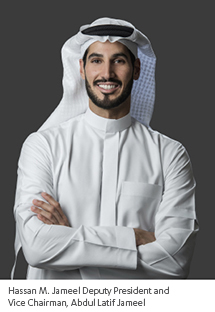 |
J-Clinic will draw on MIT’s expertise in cellular and medical biology, computer science, engineering and the social sciences to help it advance three main areas of focus:
- Preventative medicine methods and technologies with the potential to change the course of the noninfectious disease by stopping it in its tracks.
- Cost-effective diagnostic tests that may be able to both detect and alleviate health problems.
- Drug discovery and development to enable faster and cheaper discovery, development, and manufacture of new pharmaceuticals, particularly those targeted for individually customized therapies.
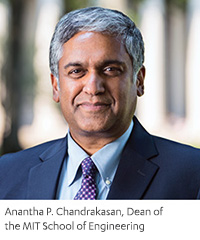 |
Anantha P. Chandrakasan, Dean of the MIT School of Engineering, has been named as the Chair of J-Clinic. “J-Clinic will make a difference in patients’ lives everywhere from major hospitals to villages in the developing world,” he says. “It will draw on MIT’s longstanding strengths in biomedical fields, on our decades of collaboration with the concentration of world-class teaching hospitals in Boston, and on our proximity to the world’s major biotech companies.”
Regina Barzilay and James Collins have been named as J-Clinic’s inaugural Faculty Co-Leads. “Today almost every aspect of our life is driven by machine learning predictions – be it travel, banking or entertainment,” says Barzilay.
|
“The only area where we do not benefit from this powerful technology is the one which impacts us the most, our healthcare. The goal of the center is to change it. We aim to bring the best of AI technology we develop in our labs at MIT to hospitals and clinics in the United States and around the world.”
Healthcare AI in action
AI and machine learning technologies are already pushing the boundaries of health care into areas that were undreamt of even a decade or two ago.
At the Royal Free Hospital in London, for example, British AI research firm DeepMind has created a tool that analyzes live health data to identify the patients at greatest risk of a sudden and fatal loss of kidney function[2].
In the United States, AI is already being used in the battle against diabetes, which is estimated to cost the country more than US$ 245 billion each year in medical bills and lost wages[3]. Virta Health’s combination of a smartphone app, AI software and real-world doctors has helped 87% of patients who had been relying on insulin to control their condition to either decrease their dose or eliminate their use of insulin completely[4].
Similarly, the use of AI is enabling review and translation of mammograms 30 times faster with 99% accuracy, reducing the need for unnecessary biopsies as well as reducing the uncertainty and stress of a misdiagnosis.[5][6]
AI has also been found to accurately find specific anomalies on chest CT images between 62% and 97% faster than manual checks, giving radiologists more time to focus on reviews that require greater interpretation or judgement[7].
In terms of drug discovery and development, the potential for AI to drastically cut the time and expense of new drug development is clear.
Novartis, Sanofi, Pfizer, GlaxoSmithKline, Amgen and Merck are among the pharmaceutical giants to have announced partnerships with AI startups aiming to discover new drug candidates for a range of diseases, from oncology and cardiology[8].
Pfizer is using IBM’s AI technology “Watson” to power its search for immuno-oncology drugs, while Sanofi has signed a deal to use UK start-up Exscientia’s AI platform to hunt for metabolic-disease therapies, and Roche subsidiary Genentech is using an AI system… to help drive the multinational company’s search for cancer treatments[9].
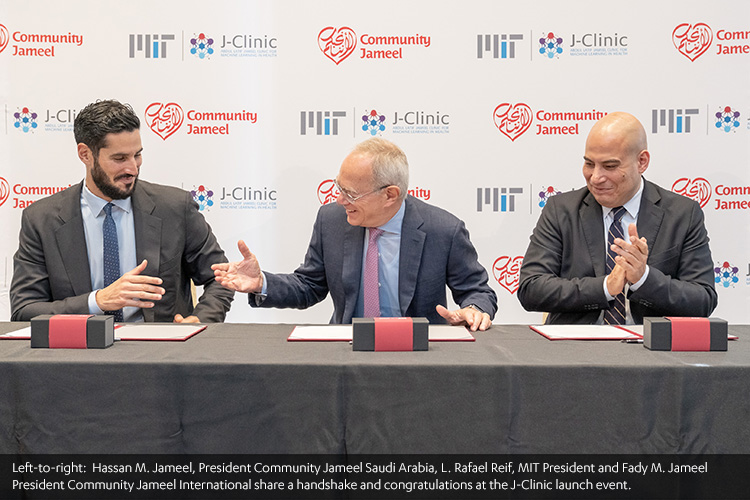
An enduring partnership
MIT and Community Jameel are longstanding partners through three other major collaborations: the Abdul Latif Jameel Poverty Action Lab (J-PAL), which was established in 2003; the Abdul Latif Jameel Water and Food Systems Lab (J-WAFS), which was established in 2014; and the Abdul Latif Jameel World Education Lab, (J-WEL) which was created in 2017.
“We have worked together for more than 20 years on a mission to make a better world,” says Fady Jameel, President of Community Jameel International.
“With its goal of revolutionizing healthcare around the globe, the launch of J-Clinic opens an exciting new chapter in the shared history of Community Jameel and MIT and builds on the achievements of our many joint projects to date.”
J-Clinic, which will represent a key part of the MIT Quest for Intelligence, will support education, research projects, workshops and other activities at the intersection of machine learning and biology. It will also seek to advance patentable research that could be commercialized and spun out through licensing to startups and pharmaceutical companies, putting these advances into real-life practice.
| MIT President L. Rafael Reif says: “The health care system has no shortage of data. But it has far too little access to the kinds of tools and experts who can translate population-level data into clinical insights that could make it possible to tune care precisely for individuals.
Building on MIT’s deep expertise in fields from cancer to neuroscience, and our longstanding connections to Boston’s world-class medical community, J-Clinic offers an accelerated path to creating new technologies that could help make health care more effective everywhere – from villages in developing nations to major teaching hospitals. |
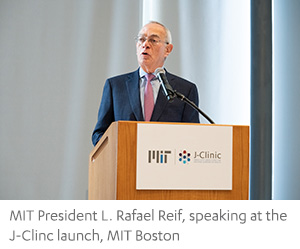 |
We are grateful to Community Jameel for their humanitarian vision, boldness, generosity and continued enthusiasm for collaborating with MIT on their efforts to help make a better world.”
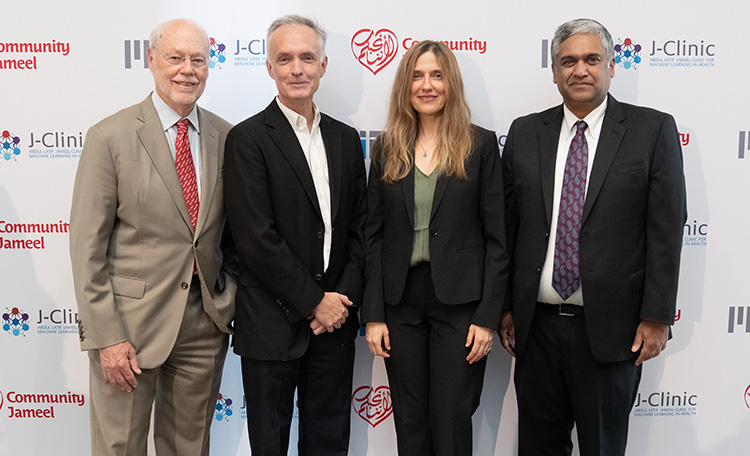
Meet the J-Clinic leadership team
Anantha P. Chandrakasan, Chair (far-right of photo)
- Dean of the MIT School of Engineering
- Co-chair of the MIT-IBM Watson AI Lab
- Chair of the MIT-SenseTime Alliance on Artificial Intelligence
Regina Barizlay, Faculty Lead (center-right of photo)
- Delta Electronics Professor of Electrical Engineering and Computer Science at MIT
- Investigator at the Computer Science and Artificial Intelligence Laboratory
- Recipient of a MacArthur Fellowship
James J. Collins, Faculty Lead (center-left of photo)
- Termeer Professor of Medical Engineering and Science
- Professor of Biological Engineering at MIT
- Recipient of a Rhodes Scholarship and MacArthur Fellowship
Phillip A. Sharp, Chair, Advisory Board (far left of photo)
- Institute Professor at MIT in the Koch Institute for Integrative Cancer Research
- Nobel Prize in Physiology or Medicine (1993)
- National Medal of Science (2004)

[1] Artificial Intelligence (AI): Healthcare’s New Nervous System, Accenture, 2017
[2] A digital revolution in healthcare is speeding up, The Economist, 2 March 2017
[3] How Artificial Intelligence Will Cure America’s Sick Healthcare System, Newsweek, 24 May 2017
[4] How Artificial Intelligence Will Cure America’s Sick Healthcare System, Newsweek, 24 May 2017
[5] What doctor? Why AI and robotics will define New Health, PwC, June 2017
[6] This AI software can tell if you’re at risk from cancer before symptoms appear, Wired, 26 August 2016
[7] 10 Promising AI Applications in Healthcare, Harvard Business Review, 10 May 2018
[8] The AI Industry Series: Top Healthcare AI Trends To Watch, CB Insights, accessed October 2018
[9] How artificial intelligence is changing drug discovery, Nature, 30 May 2018





 1x
1x

 Added to press kit
Added to press kit


